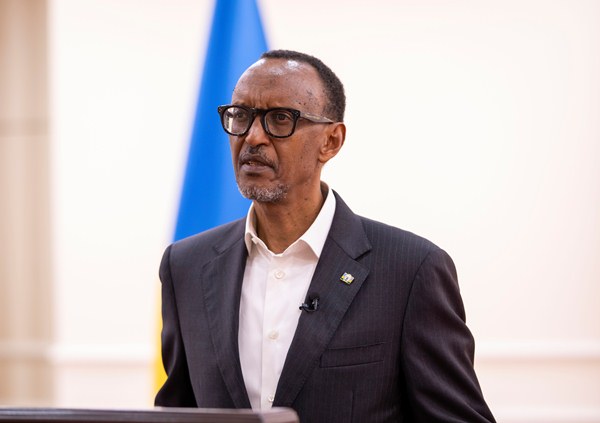
President Kagame delivered remarks on the opening day of the 75th United Nations General Assembly. The summit took place in a hybrid model due to the coronavirus pandemic.
In his message, President Kagame noted that Success depends on strengthening institutions, both national and international, including the work of scientists, innovators, and creators. It is about the positive human values that citizens and governments invest in those institutions.
President Kagame also said that this is not a time for doubt or hesitation, we have the tools to prevail on health, gender equality, environment, sustainable development, digital inclusion, and racial justice. It is about the positive values we invest in our institutions. Read below His Message:
Excellency, Volkan Bozkir, President of the General Assembly
Excellency, António Guterres, Secretary-General of the United Nations
Excellencies, Heads of State and Government
Distinguished Delegates
The 75th anniversary of the United Nations falls at a moment of uncommon peril for our people and our planet.
The Covid pandemic has claimed nearly one million lives, and pushed hundreds of millions into unexpected hardship.
This is not a time for doubt or hesitation. We have the tools to meet this test and prevail.
We mark other important anniversaries this year.
Twenty-five years ago, the World Conference on Women in Beijing charted a transformative agenda on gender equality, which continues to guide us.
The empowerment of women has made all of us safer and wealthier. But true gender equality has still not been attained in any country.
Five years ago the Paris Agreement on Climate Change was signed. Implementing this framework will slow the pace of global warming, and give our economies time to adapt to new technologies.
The Kigali Amendment to the Montreal Protocol, adopted four years ago, will play a major role, by reducing the consumption of hydrofluorocarbons.
Just over half of Member States have ratified the Kigali Amendment, which is now in force, and I call upon the remainder to ratify, as soon as possible.
Five years ago, the Sustainable Development Goals were adopted, to define our ambitions for integrated global development.
Ten years remain before 2030, but let’s not deceive ourselves about how difficult it will be to meet the targets on time.
Most countries, especially in Africa, were already off-track, before 2020. The pandemic has disrupted growth and revenue collection around the world, most likely for several years to come.
These milestones on gender, climate, and development demonstrate the achievements of multilateral action, while also reminding us how much remains to be done.
I commend the exceptional work being done by the World Health Organisation, led by Dr Tedros Adhanom. We will continue to work to reinforce the W.H.O. and make it more effective.
The creation of the Access to Covid Tools Accelerator (ACT-A), including the COVAX Global Vaccines Facility, is of critical importance for Africa.
Ensuring equitable access to vaccines, therapeutics, and diagnostics will speed up the end of the pandemic for everyone.
The pandemic has highlighted the importance of resilient national health systems and strong domestic health financing.
The African Union is championing this agenda among its Member States, with emphasis on not just spending more, but spending better.
The goal is for Africa to leverage its own resources to reinforce the impact of global health partnerships, such as the Global Fund and Gavi.
In the coming decades, prosperity will be closely linked to digital literacy and access to high-speed connectivity.
The Secretary-General’s roadmap for digital cooperation is compelling and far-sighted, building on the work of the Broadband Commission and other initiatives.
The global movement for racial justice and equality is not a passing phenomenon.
What is required, is action that builds public trust in the equal dignity of all citizens, as demonstrated in the treatment of those who have historically been most marginalised, and who continue to suffer mistreatment disproportionately.
Success depends on strengthening institutions, both national and international, including the work of scientists, innovators, and creators.
That is not just a question of funding. It is about the positive human values that citizens and governments invest in those institutions, and for which they must be accountable.
Our descendants will look back and judge how this generation responded to these challenges, especially the leaders.
Did the collective accomplishment of three generations over 75 years, in building a stronger international order, disintegrate into recrimination and resentment?
Or did we come together to once again secure global progress on a foundation of cooperation and mutual respect?
The choice is ours.
I thank you.
